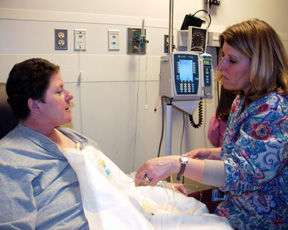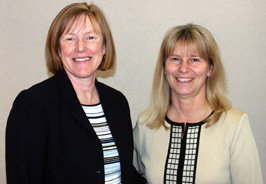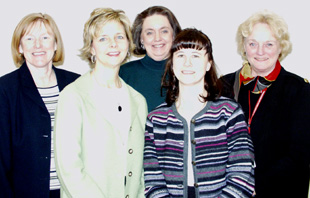 |
Diane Cox, nurse in the Lied Transplant Center, visits with Rhonda Schroeder, breast cancer patient, during a treatment. Schroeder experienced fatigue during treatment last year that made her feel like she’d run a marathon. |
“Fatigue is widespread in this population, affecting between 70 to 95 percent of patients undergoing chemotherapy for breast cancer,” said Ann Berger, Ph.D, associate professor of nursing at the UNMC College of Nursing. “Even after chemotherapy treatments end, between 30 and 50 percent of patients say their fatigue remains at least six months or doesn’t ever go away.”
Testing for ways to reduce fatigue
Dr. Berger is principal investigator of a $1.5 million, five-year grant to test new approaches for reducing fatigue in patients undergoing breast cancer treatment. The National Institute of Nursing Research, a division of the National Institutes of Health, funds the study.
 |
Ann Berger, Ph.D., principal investigator and Kathy Lee, Ph.D., a consultant on the team. |
“We usually talk about fatigue intensity level on a zero to 10 scale,” she said. “By the time somebody reports having a seven, eight, nine or 10 intensity of fatigue, their life is probably completely on hold. They’re not going to work, they’re not managing their family and they’re not feeling well enough to socialize.”
She said when nurses look for advice for managing fatigue, they find few interventions that have been tested and found to be effective. More attention now is being given because of its prevalence. “Scientifically rigorous intervention studies are needed to determine the best ways to modify fatigue during chemotherapy and to prevent chronic fatigue after treatment,” Dr. Berger said.
Cause of cancer fatigue
Although the exact cause of fatigue is not known, it is thought to be due to a combination of factors, including chemotherapy or radiation, both of which cause damage and cell death, and/or altered sleep/wake patterns, changes in nutrition, activity/exercise patterns, nausea and psychological stress.
“In the past, we have advised patients to get more rest if they experience fatigue. “There’s been a lot of encouragement to reduce activity – take leave from work, shorten your workday, get your family to do household chores and prepare meals. For some, this is a bad idea. They really needed to remain active,” said Dr. Berger, who has done several studies related to fatigue in cancer patients over the past 10 years.
 |
Part of the research team includes: Ann Berger, Ph.D., Mary Pat Roh, Barb Piper, DNSc., Julie Chamberlain and Trish Fischer. |
Recruiting study participants
For the study, researchers are recruiting 220 study participants, ages 19 and older, with stages I, II or IIIA breast cancer receiving chemotherapy, through the Nebraska Health System and other metro-area oncology clinics. In 2002, an estimated 1,250 women living in Nebraska were diagnosed with breast cancer; 80 percent were diagnosed at stage I, II, or IIIA disease. Participants will be randomly assigned to sleep or healthy eating intervention groups.
During the study, both groups will keep diaries, complete questionnaires, and wear wrist actigraphs (designed to measure sleep and activity patterns) during various treatment intervals. Study participants will receive modest stipends following successful study completion. The study, which combines activity monitoring with either a sleep or healthy eating intervention, will compare results before, during and after chemotherapy treatments.
Helping cancer patients
Dr. Berger’s interest in helping cancer patients stems from the fact that her mother died from leukemia at age 53. She saw the impact of cancer on her family, which, at the time of her mother’s diagnosis, involved five children ages 14 to 25. “I want to help any individual or family better tolerate treatment and, as a family, survive the experience,” she said.
Members of the team
Others involved in the study at UNMC include: Julie Chamberlain, MS, RN, project director; Mary Pat Roh BSN and Trish Fischer, BSN, research nurses; Susanna Von Essen, M.D., Brett Kuhn, Ph.D., Lynne Farr, Ph.D., Barbara F. Piper, D.N.Sc. James Lynch, Ph.D., and Sangeeta Agrawal, M.Sc., co-investigators; and Tom Davis, Pharm.D., and Anne Kessinger, M.D.; consultants. Kathryn Lee, Ph.D., professor, University of California, San Francisco, is serving as the study’s outside consultant.